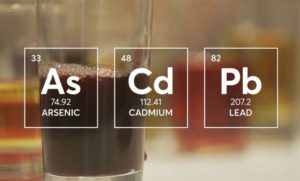Experts at Consumer Reports are warning popular fruit juices may contain harmful amounts of arsenic, cadmium and lead. Testing 45 fruit juices, from 24 national, store and private-label brands, they found elevated levels of heavy metals in nearly half of their samples.
Several discoveries include measurable levels of at least cadmium, inorganic arsenic, lead, or mercury. Twenty-one of the juices had levels of cadmium, arsenic, and/or lead which caused concern. Those seven juices were Trader Joe’s Fresh Pressed Apple Juice, 100% Juice; 365 Everyday Value (Whole Foods) Organic 100% Juice, Concord Grape; R.W. Knudsen Organic Just Concord Grape Juice; Welch’s 100% Grape Juice, Concord Grape; Welch’s 100% Grape Juice, With Grape; Great Value (Walmart) 100% Juice, Cranberry Grape; Welch’s 100% Juice with Antioxidant Superberry.

Fruit juices may include some unsavory ingredients…like toxic metals.
Of those twenty-one juices, seven had levels that could harm children who drink 4 ounces or more, while nine posed risks to kids at 8 ounces, or 1 cup, or more daily. They also found organic juices were not any better in terms of metal content than conventional juices. Particularly concerning to researchers was the risk this posed to children who are known to consume a great deal of fruit juice. Exposure to metals can cause serious damage to a child’s brain as children’s brains are still developing and are vulnerable at that age.
This brain damage can lead to learning and developmental problems as they grow. Worse, this risk is made worse as they already encounter metals in other foods such as baby food, rice and water. While the U.S. Food and Drug Administration has set standards for lead in juice, that being 50 parts per billion (ppb), Consumer Reports believes those levels should be much lower. More than half of the drinks tested contained 1 ppb or less, though Welch’s 100% Juice With Antioxidant Superberry
and Welch’s 100% Grape Juice, Concord Grape averaged more than 5 ppb.
The FDA’s acceptable level for inorganic arsenic is 10 ppb and only one drink, Trader Joe’s Fresh Pressed Apple Juice had arsenic levels above the FDA’s guideline. The FDA does not have a limit for cadmium, however, and three of the juices had levels of 1 ppb or higher.
Two years ago, the American Academy of Pediatrics warned children should not drink fruit juices in their first year. They cited concerns about obesity, tooth decay and other health concerns and had other recommendations including limiting children ages 1 to 3 years old to 4 ounces of juice daily.
They suggested older children up to 18 should not consume more than 8 ounces of juice per day. Experts blame part of the problem on the globalization of the food supply and lack of regulation in other countries. Fruits such as apples and grapes are processed with the skin and co-mingling with the inside of the fruit. This can elevate heavy metal levels.
Adults are also at risk. A lifetime exposure to heavy metals can increase the risk of bladder, lung, and skin cancer. In addition, they can have cognitive and reproductive problems and develop illnesses like type two diabetes.


